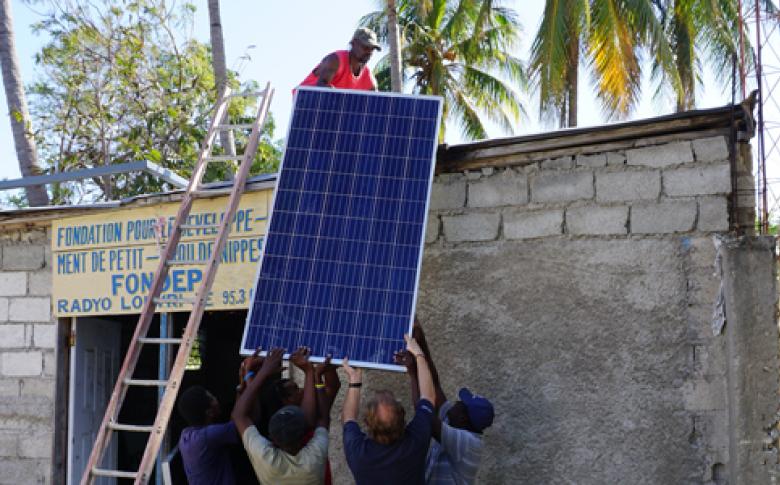Community Radio Stations Back On The Airwaves In Hurricane-Affected Areas

HAITI - When Hurricane Matthew ripped through Haiti in October 2016, many communities struggled to recover amid torrential rains, blocked routes and the interruption of radio stations and telephone networks. In addition to humanitarian assistance, people were desperate for something else: access to accurate, useful information. The World Food Programme (WFP) and media development organisation Internews are restoring four community radio stations damaged by Hurricane Matthew, improving their ability to transmit localised humanitarian messages and enabling Haitians to receive critical updates and engage in the recovery of their communities.
“When communities know what assistance they can receive and for how long, it helps them to make the right choices to rebuild their lives after a disaster” explain Ronald Tran Ba Huy, WFP Country Director in Haiti. “WFP broadcast its hotline number on local radio after the hurricane to allow affected people to call to provide feedback or in case they had any questions about WFP’s assistance”.
After Internews conducted an independent assessment of media outlets in Jeremie, Abricot and Latiboliere, areas worst affected by Hurricane Matthew, WFP and Internews found that the majority of Haitians turn to local radio as their preferred way to find key information about the humanitarian response and share news.
“Internews expertise is, and has always been, in amplifying community voices while at the same time providing them the information they need to make informed decisions about their lives,” said Anahi Ayala Iacucci, Internews Senior Director of Humanitarian Programs. “With this project we have been able to reconnect hundreds of people affected by Hurricane Matthew to allow them to access reliable and verified information.”
Four radio stations across Grand-Anse, Sud and Nippes are being rehabilitated and provided with basic power and Information Technology support, equipping them to receive, create and transmit content. Complementing humanitarian efforts in Haiti, community leaders, local authorities and operational agencies will be able to leverage those stations to broadcast coordinated messages on distribution schedules and nutrition, for example, as well as encourage dialogue on pressing issues affecting local communities.
“The radio station in Dame Marie was reaching around 30,000 people with their own makeshift repairs,” said Ben Noble, Internews Country Representative in Haiti. “After rehabilitation, this station can reach an additional 93,000 people, so a total of more than 120,000.”
The community radio rehabilitation project in Haiti is being implemented by Internews, WFP, as global lead of the Emergency Telecommunications Cluster (ETC), and WFP’s Fast IT and Telecommunications Emergency and Support Team (FITTEST).
“Though each disaster is unique, we see that access to vital information in emergencies is an ever-present need and really does mean survival. The work by the ETC and our global partners to restore the community radio stations will enable Haitians to share news and information, as they rebuild their communities and livelihoods” said Enrica Porcari, Chair of the ETC and WFP Chief Information Officer and Director of IT.
Haiti is one of the world’s most disaster-prone countries. Seven years after an earthquake flattened the capital and impacted 3 million people, 2016’s Hurricane Matthew affected 1.125 million people in rural areas along the country’s southern coast, killing more than 500 and destroying livelihoods.
World Food Programme (WFP) is the world's largest humanitarian agency fighting hunger worldwide, delivering food assistance in emergencies and working with communities to improve nutrition and build resilience. Each year, WFP assists some 80 million people in around 80 countries. www.wfp.org
Emergency Telecommunications Cluster (ETC) is a global network of humanitarian, private sector and governmental organisations that work together in disasters to provide vital communications services. The ETC is one of the 11 clusters designated by the Inter-Agency Standing Committee (IASC). The ETC seeks to ensure that by 2020, all those responding to humanitarian emergencies – including affected communities – have access to vital communications services. www.ETCluster.org
Internews works to ensure access to trusted, quality information that empowers people to have a voice in their future and to live healthy, secure, and rewarding lives. Internews responds to crises and emergencies around the world to meet information and communication needs of disaster-affected people. Information save lives, reduces suffering and enables people in the midst of a disaster to take an active role in their own survival and recovery. Internews, an international non-profit organization, has worked in Haiti since 2010. www.internews.org